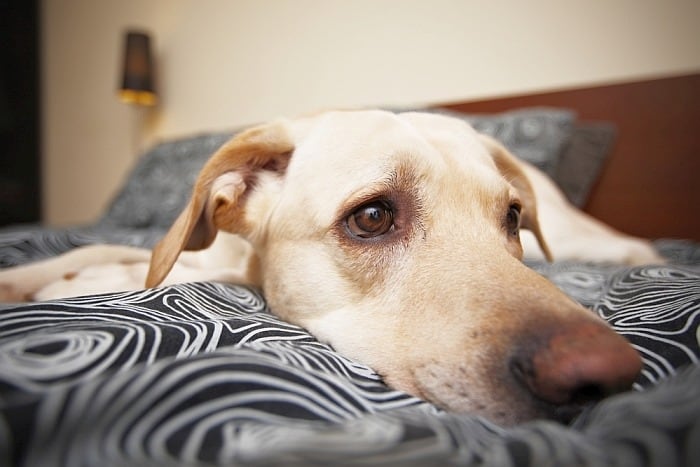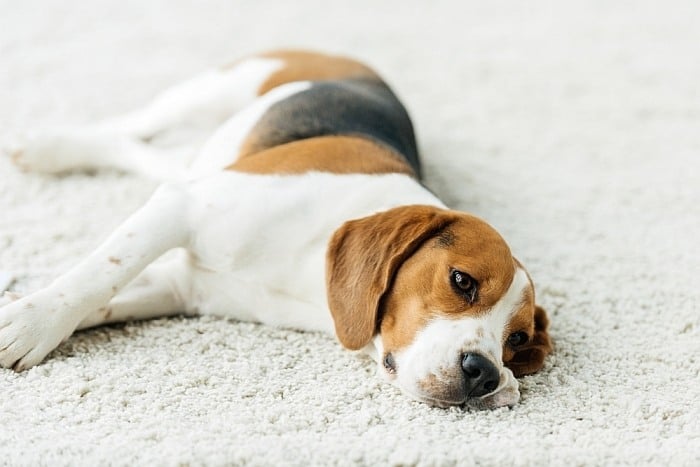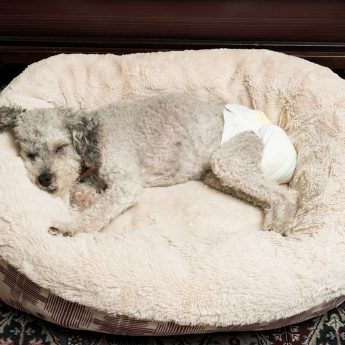Dogs who’ve recently had surgery often appear a bit down in the dumps after returning home. This concerns many owners, who don’t know if the problem is serious or what to do to cheer up their pet.
We’ll try to help you understand post-operative depression below and explain some of the most common symptoms of depression, so you know what to look for. We’ll also provide you with a few tips for putting a bit of pep back in your pooch’s step.
Why Do Dogs Become Depressed After Surgery?
It’s difficult to pinpoint the exact reasons dogs may become depressed after surgery, but it is likely due to a combination of the following factors:
Physical Discomfort
Dogs will often be in a bit of pain or discomfort following a surgery. This alone is enough to trigger mild depression in some pups. Be sure to talk to your vet if you think your dog is in pain – your vet may be able to prescribe medications to keep your dog more comfortable while he heals.
Hormonal Changes
Hormones play a large role in your dog’s emotional state, and when surgical procedures disrupt your pet’s hormone levels, depression often follows. Dogs who’ve been spayed or neutered are the most likely to suffer hormonally triggered depression, thanks to the removal of their reproductive organs.
Reactions to Medications
The medications used during and after surgery may cause your dog to feel depressed. This not only includes the anesthesia medications used during the procedure, but the medications you come home with too.
The Stress of the Experience
Stress alone can trigger depression, and surgery can be a very stressful experience for your pet. Having to go into the vet’s office, being poked and prodded by the staff, and then having to recover in a lonely kennel until mom or dad returns can overwhelm a dog and trigger a depressive episode.
The Cone of Shame
Dogs occasionally need to wear an E-cone or E-collar to prevent them from licking their surgical wounds. Dogs often hate wearing these devices, and they may become mildly depressed while being forced to do so.
How Long Does Post-Operative Depression Last?
Different dogs will suffer from depression for different lengths of time, but most dogs probably start to feel normal again after a few days or weeks. The duration of the depression will depend on a variety of factors, including the type of procedure performed, your dog’s mental state before the surgery, and his age.
As long as your dog’s depression appears to be easing over time, and it doesn’t seem to be getting worse, there’s likely no cause for concern. Just call your vet, explain the symptoms you are observing, and heed the advice provided.

Signs and Symptoms of Depression in Dogs
It’s usually pretty easy to tell when your dog is depressed. In fact, depressed dogs often exhibit many of the same symptoms depressed people do. Each dog is an individual, but most depressed pups will exhibit one or more of the following symptoms:
- Lethargy
- Appetite changes
- Food refusal
- Excessive sleeping
- Inability to sleep
- Withdrawal
- Reduced activity
- Loss of interest in things he normally enjoys
Note that while depression is rarely dangerous for dogs, and it will often resolve itself with time, it is important to ensure that your dog isn’t suffering from some other malady.
For example, dogs suffering from arthritis or hip dysplasia may become withdrawn and less active than normal because of the pain they’re experiencing. At other times, the depression may be linked to a hormonal problem or an underlying illness, such as diabetes, which will require treatment.
So, while you needn’t load the pooch in the car and race over to the vet because he is acting a bit blue, you should seek veterinary assistance if your dog isn’t able to snap out of the depression within a few days. You’ll also want to contact your vet if your dog exhibits any signs not associated with depression – such as skin or coat problems, intestinal distress, or obvious pain.
A fever (especially one associated with depression) can also be a sign of trouble, as it may indicate an internal infection. So, seek immediate veterinary attention if your dog’s temperature reaches 103 degrees Fahrenheit or higher.
Tips for Cheering Up Your Pup
There are a variety of things you can do to help cheer up your pet and help him feel like his old self. Some of the most effective include:
Engage in Activities Your Dog Likes
This is the simplest solution to doggie depression: Just do some stuff he likes doing.
Does your dog like fishing treats out of his KONG? Does he like going for a ride in the car? Does he like lounging on the back porch with you? Well, get to it and put some wag back in your pupper’s tail.
Just be sure to obtain your vet’s blessing before engaging in any vigorous activities, as some surgical procedures will require you to keep your dog calm and quiet while he heals.
Heed your vet’s specific advice, but he or she will normally caution you to prevent your dog from running, jumping, swimming, or engaging in any other type of vigorous play until the stitches are removed or dissolve on their own (usually about 10 to 14 days).
You can still give your dog some love and attention, but you’ll need to keep things relaxed (check out a few creative solutions for stimulating post-op pets here).
Get Social
Spending some time with other dogs often helps dispirited pooches snap out of depressive episodes. This obviously won’t work with all dogs, as some don’t seem to like palling around with other dogs as much as others. But dogs who are social butterflies will often respond favorably to a trip to the local dog park.
Just be sure to keep your dog on a lead to prevent him from running or playing too wildly. Also, use a bit of extra caution as some dogs become a bit more irritable than normal following an operation. So, keep an eye on your pooch and make sure that he plays nicely with others.
Spend More Time with Your Pet
Some dogs simply need more attention from mom or dad following a surgery. You may want to move your dog’s bed closer to the places you spend lots of time, or you may need to make more time for play. It may even be a good idea to work from home for a few days, if that’s possible in your situation.
If you rely on the services of a dog walker, you may want to schedule more frequent (or lengthy) visits. Dogs often bond strongly with their walkers, and this can help perk them up too.
Stimulate Your Pup’s Coat, Skin, or Muscles
Another great way to lift your pup’s spirits is through some basic physical stimulation and pleasure. So, consider brushing him in a slow, relaxing way, or just giving him an extra-long, extra-awesome scritching session. You could even give him a canine massage if your pup enjoys this kind of attention.
But no matter what kind of stimulation you offer, just be sure that:
- Your dog enjoys it — don’t brush your pup if he hates grooming time
- You carry out these activities in an even gentler than usual manner
- You keep your canine calm while doing so
The last one is really important, as you don’t want him to get worked up and pop his stitches. But a half hour of ear massaging or gentle scritching while you watch TV may help him feel much better.

Medications: When Nothing Else Works
Although most dogs who suffer from post-operative surgery begin feeling better pretty quickly, some dogs may suffer from a prolonged bout of depression. In such cases, consider speaking with your veterinarian about medications that may help your four-footed friend feel better.
Your vet may prescribe a common canine-friendly antidepressant or antianxiety medication originally developed for humans, such as Paxil, Prozac, or Zoloft. These medications are often quite effective, although they may take several weeks to begin generating results.
Of course, on the flip side, some post-op medications may actually contribute to your dog’s depression. But in such cases, your vet may be able to reduce the dosage or switch up the prescription to help your pet feel better.
***
Ultimately, postoperative depression isn’t much different than depression arising from other causes. Just try to do your best to comfort your pooch and mix up your routine a bit to help drag him out of his despondent state. With luck, he’ll be back to his old self in no time.
Has your dog ever suffered from post-operative depression? How did you help him feel better? Do you have any helpful tips you can share? Let us know all about your experiences in the comments below.









6 Comments
March 19, 2023
My Rhodesian Ridgeback (14 mo) was neutered 2 1/2 weeks ago. Yesterday he woke up shivering and fearful. He did calm down and ate both of his daily meals. His bathroom routine is normal. He just doesn’t seem himself. Is this normal for hormonal changes?
March 20, 2023
It could be, Kathy, but it could also be a sign of something else.
We’d recommend giving your vet a call, just to be on the safe side.
October 5, 2022
My dog had 2 surgeries that were 2 weeks apart. What we thought was an infected toe nail that had spread to the bone was in fact a little cancer. It was discovered after the first surgery which was essential getting the toe “declawed”. The second surgery consisted of removing the entire digit. We noticed after the first surgery he was definitely more fearful of noises. Noises that in the past he did not react to send him flying upstairs to his bed or to the corner of the bedroom. There is also sometimes the panting that goes along with his fear. He definitely got extra love and spoiling throughout the process and now that he is feeling better we’re getting back to walks and visiting with friends. Wondering if there are any other suggestions???
October 6, 2022
Hey there, Liana.
Your poor pooch! It sounds like he’s been through quite an ordeal.
Time may be all that’s necessary to have him feeling like his old self again, though there are obviously no guarantees — he may just end up being more nervous than he formerly was from here on out. And that’s OK! Nervous doggos can still live their best lives; they just may need a little extra comfort and consideration.
All that said, you may want to try doing some confidence-building activities to help alleviate some of that fear.
Let us know how it goes! We’ve got our fingers crossed for him.
June 28, 2020
My dog’s been depressed for 18 months after surgery Ive tried everything, the vet shrugged, I don’t want to use antidepressants as he was given one before surgery and I’m worried it contributed to his low seratonin. Nobody can help it’s very sad to watch he was a wonderfully active, social and healthy boy he loved life now he hates everything and everyone.
June 29, 2020
Sorry to hear your pooch is down in the dumps, Ravi!
More than that, we’re sorry that your vet doesn’t seem interested in helping.
It’d probably be a good idea to at least have a consultation with another vet.
Best of luck!